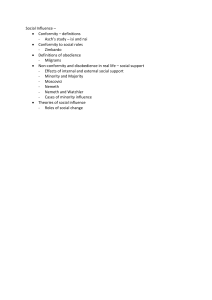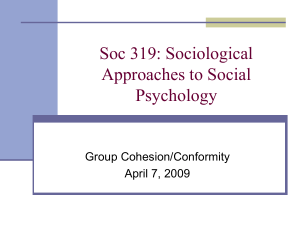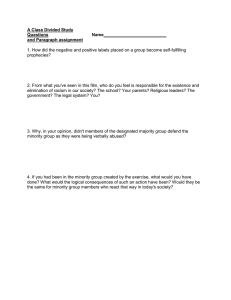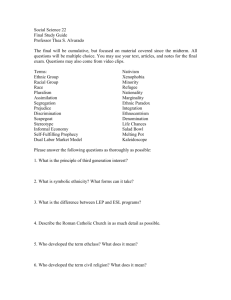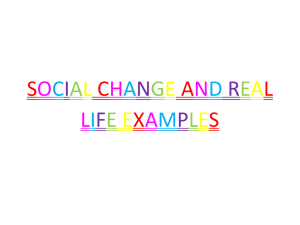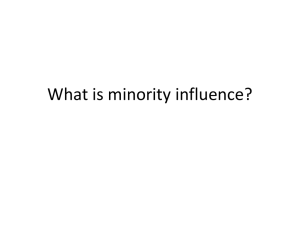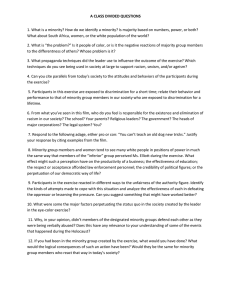Welcome to Leadership and Group Dynamics Psychology 160
advertisement
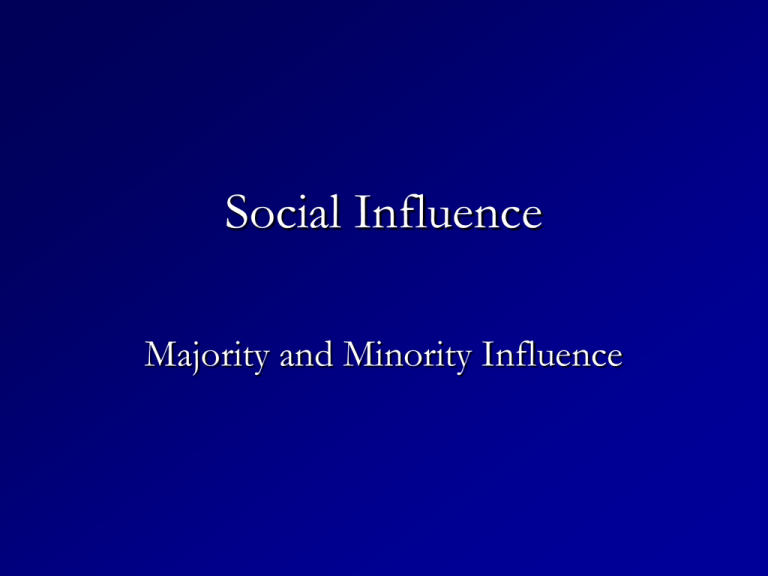
Social Influence Majority and Minority Influence Outline Improving Group Effectiveness: Majority Influence Majority vs Minority Influence How do influence processes work? Improving Group Effectiveness: Dissent Video Clip: 12 Angry Men Informational Influence and Improving Group Effectiveness Avoid pluralistic ignorance Share information with group; reduce uncertainty and ambiguity Clarify faulty assumptions Normative Influence and Improving Group Effectiveness Use group pressure on deviant members Use high status members to model and reinforce new norms To find out real thoughts, ask privately and anonymously Make desired norms clear and specific The Majority is Powerful …but What About... Galileo Susan B Anthony & Elizabeth Cady Stanton Martin Luther King Jr. Majority and Minority Influence Majority influence: – Larger group influences smaller subgroup or individuals Minority influence: – The individual or smaller group influences the larger group Moscovici & Minority Influence Criticized North American research on conformity as – “fashioned and considered from the point of view of the majority, authority and social control” He advocated a point of view of – “the minority, the deviant and social change” Why the dichotomy between European and North American scholars? – Impact of ideology and values on science Moscovici & Minority Influence Color Perception Study (Moscovici and colleagues) – 6 BLUE slides – 4 naive subjects, 2 confederates – Consistent condition Confederates always said green – Inconsistent condition Confederates said green 24 times and blue 12 times – Control condition Groups made up of just naive subjects Results 20 15 Percentage saying 10 GREEN 5 0 Control Inconsistent Consistent Minority Minority Color Perception Study: Phase Two Discrimination task – 16 hues on blue-green spectrum Results: – Participants in both experimental groups had lower threshold for "GREEN“ than those in control group Factors Affecting Minority Influence Investment Self-interest Ingroup vs outgroup members Flexibility and Consistency Example of Flexibility & Consistency Nemeth et al (1974) Experiment similar to Moscovici’s, but the confederates (Cs) say either green or green-blue – (all the slides still being blue) Results: – If Cs said these at random there was no effect on the majority – If Cs said them in a consistent way - green to the brighter slides and blue-green to the dimmer slides, there was 21% influence Minority Influence and Status Is early conformity important? – It may earn some ‘status’ with group members Hollander’s studies on early conformity – – – – 5 person groups; complex decisional task Confederate demonstrated early conformity or not Confederate showed nonconformity Results: Minority influence greater when confed. initially conformed Theory of Idiosyncrasy Credits (Hollander) To dissent effectively, you must first earn the right by paying conformity dues called idiosyncrasy credits. High status have more idiosyncrasy credits than low status Reconciling Hollander and Moscovici Different viewpoints: Hollander: early conformity is good Moscovici: consistent nonconformity is important How Do Influence Processes Work? Single process model – Social Impact Theory Dual process model – Two processes: Compliance vs Conversion Social Impact Theory Latane’s (1981, 1996) theory of dynamic social impact social influence is primarily a function of 3 variables: 1. Strength (status) 2. Immediacy (proximity) 3. Number (how many others are trying to influence me? how big is my group?) I = f(SIN) Compliance vs Conversion Majorities evoke only public conformity via normative influence: COMPLIANCE – Resolve conflict in public but resist change in private because it threatens self-determination – Not very thoughtful process; results in changes in overt behavior not necessarily private attitudes – Direct influence Minorities evoke conversion via informational influence : CONVERSION – Fear of losing face/appearing deviant in public realm, therefore resolve conflict in private realm – Force a systematic processing of information; results in changed attitudes – Indirect influence Compliance vs. Conversion Example study (Nemeth & Wachtler, 1974) 5 person simulated jury Make award in personal injury case Confederate argued for low award Results: – Direct influence: Final vote: majority unchanged- gave big award – Indirect influence: On second case gave significantly smaller awards Convergent & Divergent Thinking Exposure to minority: – – – Attend to more aspects of the situation More divergent thinking More likely to detect novel solutions or come to new decisions Exposure to majority: – – – – More stressful Focus on aspects of the stimuli pertinent to the majority view More convergent thinking Tend to adopt proposed solution to neglect of more novel solutions Implications of Deviance for Enhancing Group Effectiveness Encourage the expression of minority viewpoints Consider earning high status in group before deviating If low status, calmly and persistently present a reasonable argument Avoid the Abilene Paradox Minority Influence Video: 12 Angry Men Small Groups Exercise Discuss the film clip you just watched. How did minority influence work? Why do you think the main character was able to persuade the other 11 jurors?
